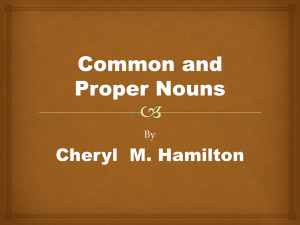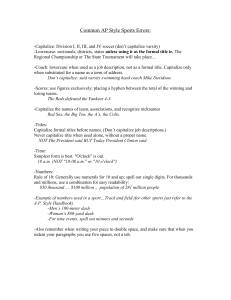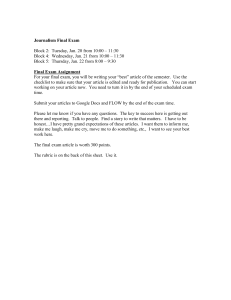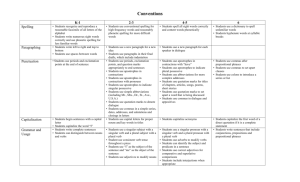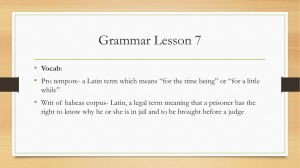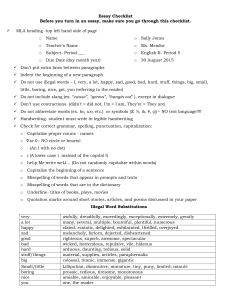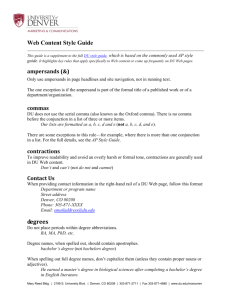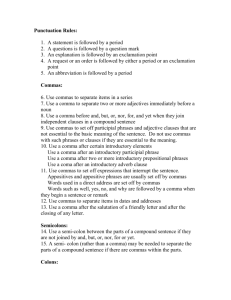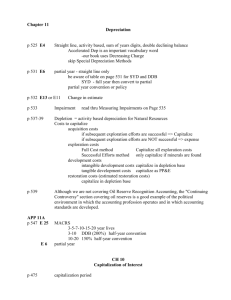Grammar and Spelling
advertisement
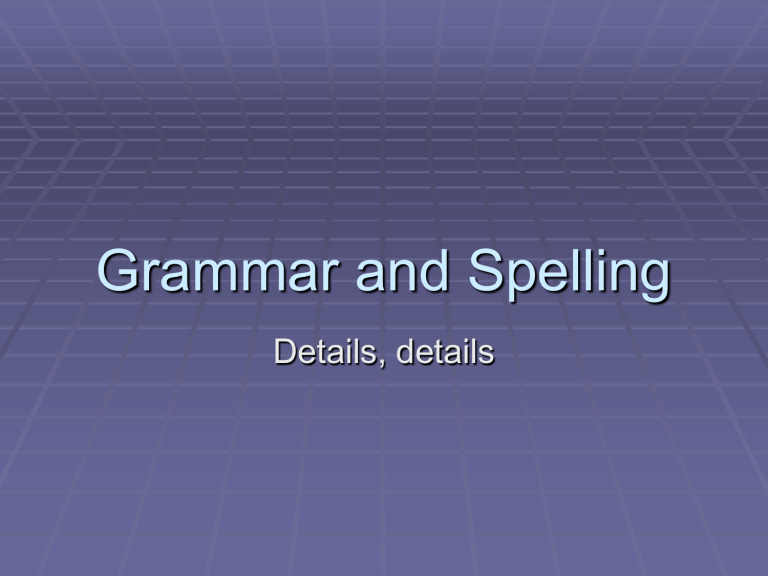
Grammar and Spelling Details, details Preferred spellings Adviser Afterward (not Damage (for afterwards) All right (never alright) Ax Baby-sit, baby-sitting, baby sitter Backward (not backwards) destruction); damages (for court awards) Employee Forward (not forwards) Goodbye Gray (not grey) Kidnap, kidnapped, kidnapper, kidnapping Likable (not likeable) Percent (one word, spelled out) Teen, teenager, teenage (do not use teenaged) Vice president (no hyphen) Whiskey, whiskeys Preferred spellings for broadcast copy Babysitter (one word) Teen, teen-ager, teen-age Punctuation Comma/ages Use commas to separate a person’s age from his or her name. Artie Shaw, 94, died Wednesday. Comma/state names Use commas to separate the name of a state from the name of a city. Use commas before and after the state name unless it ends the sentence. The bus traveled from Cairo, Ill., to Knoxville, Tenn. Comma/hometowns Use commas to set off a person’s hometown when it is placed in apposition to the name. Mary Richards, of Minneapolis, and Maude Findlay, of Tuckahoe, N.Y., attended the ceremony. Comma/quotations Use a comma after the attribution to introduce a one-sentence quotation. She said, “The city has overspent its budget.” When the attribution follows the quotation, replace the period at the end of the quotation with a comma. “The city has overspent its budget,” she said. Use commas before and after attribution that is in the middle of a quotation. “Before the start of the war,” the senator said, “the United States should have planned to fight insurgents.” Always place commas and periods inside quotation marks. Use commas to set off attribution at the end or in the middle of an indirect quotation. The war plans were inadequate, he said. The time has come, the president said, to engage in direct negotiations. Do not use a comma with indirect or partial quotations that start with the attribution. Tucker said the plane was low on fuel. Comma/series Use commas to separate elements in a series. Do not put a comma before the conjunction in a simple series. The players’ jerseys are purple, yellow and white. Comma/appositives An appositive is a word or expression placed beside another in order to explain or elaborate on the other word or expression. Appositives should have commas before and after them, unless they come at the end of a sentence. Bill Smith, the leadoff batter, struck out. The letter came from Jane Mitchell, the state treasurer. Colon/lists The most frequent use of the colon is at the end of a sentence to introduce a list, tabulation or text. There were three considerations: expense, time and feasibility. Colon/quotations Use a colon after the attribution to introduce a quotation of more than one sentence. The prosecutor said: “The gunman showed no mercy. He shot both victims as they begged for their lives.” Possessives For common or proper nouns, singular or plural, that do not end in s, add an apostrophe and an s. (John’s house) For singular common nouns that end in s, add an apostrophe and an s, unless the next word begins with an s. (boss’s house) (boss’ swing) Singular common or proper nouns that end in ce, z or x, add an apostrophe and an s. (Rance’s house, Chaz’s car and Boudreaux’s restaurant. For singular proper nouns that end in s, add only an apostrophe. (Tess’ comb) For plural common or proper nouns ending in s, add only an apostrophe. (Jones’ car) See Appendix C of “Reporting for the Media” for more rules and examples. Semicolon Use semicolons to separate elements in a series where one or more of the elements has internal punctuation. He leaves three daughters, Jane Smith of Wichita, Kan., Mary Smith of Denver and Susan Kingsbury of Boston; a son, John Smith of Chicago; and a sister, Martha Warren of Omaha, Neb. Note that a semicolon is used before the final element in the series. Punctuation for broadcast copy In general Punctuation should help a newscaster understand and read a story. Most of the rules for punctuating print copy apply to broadcast copy Comma/ages and hometowns Do not use commas to set off ages and hometowns from names. Instead, put ages and hometowns in separate sentences. The governor has appointed James Burns to lead the Economic Development Department. He is a 48-year-old banker from Pleasanton. Commas/quotations Avoid direct quotations in stories. Use paraphrases or tape instead. Where a direct quotation is central to a story, punctuate it as for print, but use a phrase that would make clear to listeners the words are those of the source, not of the reporter. In the president’s words, “He can run, but he can’t hide.” Capitalization The Mathematics Department voted for the curriculum change, but the English Department opposed it. The mathematics department voted for the curriculum change, but the English department opposed it. The medal of honor was awarded to 1,522 servicemen from the civil war, but only 464 received the award during world war two. The Medal of Honor was awarded to 1,522 servicemen from the Civil War, but only 464 received the award during World War II. Many American holidays, like memorial day and labor day, are on Mondays. Many American holidays, like Memorial Day and Labor Day, are on Mondays. Although the Constitution allows references to god in such things as the pledge of allegiance, it does not allow public schools to require students to read the bible. Although the Constitution allows references to God in such things as the Pledge of Allegiance, it does not allow public schools to require students to read the Bible. He saw two cans of coke in the cup holders of the pontiac, but there was only a box of kleenex on the seat of the Truck. He saw two cans of Coke in the cup holders of the Pontiac, but there was only a box of Kleenex on the seat of the truck. Although it is not as tall as other Buildings, many people admire the Art Deco style of the Chrysler building. Although it is not as tall as other buildings, many people admire the Art Deco style of the Chrysler Building. If you want to rent the grand ballroom, speak to the reservations clerk in room 310. If you want to rent the Grand Ballroom, speak to the reservations clerk in Room 310. Thousands of tourists visit the capitol every year to see where congress holds its sessions. Many also visit the capitol in Richmond to see where the Virginia general assembly sits. Thousands of tourists visit the Capitol every year to see where Congress holds its sessions. Many also visit the Capitol in Richmond to see where the Virginia General Assembly sits. According to the congressional record, 335 members of the house voted for the resolution, but only 42 members of the senate supported it. According to the Congressional Record, 335 members of the House voted for the resolution, but only 42 members of the Senate supported it. The first amendment to the constitution guarantees Freedom of the Press, but courts have held libel suits against the media are Constitutional. The First Amendment to the Constitution guarantees freedom of the press, but courts have held libel suits against the media are constitutional. From southern California, they traveled Northeast until they reached the great plains and then headed South for the gulf coast. From Southern California, they traveled northeast until they reached the Great Plains and then headed south for the Gulf Coast. A Presidential order set an Administration policy of increasing traffic on the Mississippi and Missouri Rivers. A presidential order set an administration policy of increasing traffic on the Mississippi and Missouri rivers. Construction crews moved thousands of tons of Earth to construct the bunkers from which spectators could watch the spacecraft begin its journey from earth to Mars. Construction crews moved thousands of tons of earth to construct the bunkers from which spectators could watch the spacecraft begin its journey from Earth to Mars. The state patrol agreed to send investigators to help the Lewistown city police solve the double homicide. The State Patrol agreed to send investigators to help the Lewistown City Police solve the double homicide. The two cars collided at the intersection of United States highway 40 and state route seven, five miles South of I-44. The two cars collided at the intersection of U.S. 40 and state Route 7, just five miles south of Interstate 44. The joint amphibious assault exercise will involve troops from the British Army, the French Army and the United States army and marines, with the US navy providing transportation. The joint amphibious assault exercise will involve troops from the British army, the French army and the U.S. Army and Marines, with the U.S. Navy providing transportation. “We’re an equal opportunity bank. It makes no difference to us whether a customer is Black, White, arab or chinese,” said Harriet Smith, the black vice president of the bank. “We’re an equal opportunity bank. It makes no difference to us whether a customer is black, white, Arab or Chinese,” said Harriet Smith, the vice president of the bank. In the 1920’s, it was enough for most students to learn their ABC’s and to mind their ps and qs, but by the 50’s students needed more skills. In the 1920s, it was enough for most students to learn their ABCs and to mind their p’s and q’s, but by the ‘50s students needed more skills. The candidate is not a member of the Republican party or of the Democratic party. She says she belongs to the libertarian party, but her ideas are more Socialistic. The candidate is not a member of the Republican Party or of the Democratic Party. She says she belongs to the Libertarian Party, but her ideas are more socialistic. Sen. Susan Collins, r-Me., and Rep. Mike Ross, d-Arkansas, have agreed to cosponsor the bill. Sen. Susan Collins, R-Maine, and Rep. Mike Ross, D-Ark., have agreed to cosponsor the bill. The rockies and the appalachians are the two major Mountain Ranges in North America, but neither has peaks as high as those in the Himalayan mountains in asia. The Rockies and the Appalachians are the two major mountain ranges in North America, but neither has peaks as high as those in the Himalayan Mountains in Asia. “The people of some countries may call the United States the ‘great satan,’ but it is the international terrorists who are truly Satanic,” the ambassador said. “The people of some countries may call the United States the ‘great Satan,’ but it is the international terrorists who are truly satanic,” the ambassador said. The introduction of Astronaut Tom Leffler was made by mayor Anne Swenson and Herbert Williamson, the Governor. The introduction of astronaut Tom Leffler was made by Mayor Anne Swenson and Herbert Williamson, the governor. Capitalization in Broadcast Copy The U.S. Department of Defense and the U.S. Department of Agriculture are cooperating on a program to protect crops and livestock from terrorist attacks. The U-S Defense and Agriculture departments are cooperating on a program to protect crops and livestock from terrorist attacks. Capitalization In general Do not capitalize words unnecessarily. Use capital letters only as required by the rules summarized here or in the AP Stylebook. Academic departments Use lowercase except for proper nouns that are part of a department’s name. the history department the department of history the English department the department of English Awards/events/holidays/wars Capitalize awards. Medal of Honor Capitalize historic events and periods. the San Francisco Earthquake; the Great Depression Capitalize holidays. Thanksgiving Day Capitalize wars The Civil War; World War II Bible/God Capitalize Bible, without quotation marks, to refer to the Old and New Testaments. Quran is the preferred spelling for the Muslim holy book, and it, too, should be capitalized. Capitalize God or Allah to refer to monotheistic deities; lowercase pronouns referring to the deity. Brand names Capitalize brand names. Pontiac Coke Kleenex Lowercase generic terms. sedan cola facial tissue Buildings/Rooms Capitalize the proper names of buildings, including the word building if that is part of the name. Empire State Building Capitalize the names of specifically designated rooms and the word room when it’s used with a number. the Blue Room Room 345 Capitol Capitalize U.S. Capitol and the Capitol when referring to the building where Congress meets. Capitalize Capitol when referring to the building where a specific state legislature meets. the Indiana State Capitol Congress Capitalize U.S. Congress and Congress when referring to the U.S. Senate and House of Representatives. Lower case congressional, unless it is part of a proper noun, such as the Congressional Record. Capitalize legislature and similar terms when referring to specific state legislative bodies. the Kansas Legislature Constitution Capitalize references to the U.S. Constitution, with or without the U.S. modifier. Capitalize Bill of Rights and First Amendment (and all other amendments). Lowercase the adjective constitutional. Directions/Regions Lowercase north, south, southwest, etc., when they indicate a compass direction. Des Moines is north of Kansas City. Capitalize such words when they indicate a region. The storm hit Northeast states hardest. Capitalize names of well known regions. the Deep South; the East Side of Manhattan; Southern California. Do not capitalize administration first lady first family government presidential presidency priest seasons (fall, winter, etc.) years in school (sophomore, junior, etc.) Also, lowercase the common-noun elements of proper names in plural uses. Elm and Main streets the Missouri and Mississippi rivers Earth Generally, lowercase earth. She is a down-to-earth person. Capitalize when it’s used as the proper name of the planet. Mars is farther from the Sun than Earth. Government Capitalize city, county, state and federal when part of a proper name. Crawford County Commission Capitalize city council, city hall, police department, legislature and assembly when part of a proper name. Boston City Council; Chicago Police Department; Florida Legislature Retain capitalization when the context makes clear the reference is to a specific body. the City Council; the Police Department; the Legislature Highways Use these forms for highways identified by number. U.S. Highway 1; U.S. Route 1; U.S. 1; Illinois 34, Illinois Route 34; state Route 34; Interstate 495; Interstate Highway 495. On second reference, use I-495. When a letter is appended to a highway number, capitalize it. Route 1A Military Capitalize the names of U.S. armed forces. U.S. Army the Navy Marine regulations Lower case the forces of other nations. the French army Nationalities/Race Capitalize proper names of nationalities, races and tribes. French; Arab; Caucasian; Eskimo Lowercase words such as black, white and mulatto. Do not use colored; in the United States, the word is considered derogatory. Do not identify people by race unless it is necessary to the story. Plurals To form the plurals of a number, add s with no apostrophe. 1920s To form plurals of a single letter, add ’s. To form plurals of multiple letters, add only s. Mind your p’s and q’s. She knows her ABCs. Political parties Capitalize both the name of the party and the word party. the Republican Party Also capitalize Communist, Socialist, Libertarian when they refer to a specific party or party member. Lowercase references to a political philosophy The Libertarian candidate received 348 votes. The foundation advocates libertarian policies. Use a D or an R and the abbreviation for the state to identify members of Congress. Sen. Mitch McConnell, R-Ky., … Rep. Nancy Pelosi, D-Calif., … Use a D or an R and home town or district to identify members of state legislatures, city councils or other legislative bodies elected on a partisan basis. State Sen. Joe Adams, R-Walnut, … Councilwoman Alice Goode, D-3rd District,… Proper nouns Capitalize proper nouns, which uniquely identify persons, places or things. Mary Boston the Columbia River Lowercase common nouns when they stand alone. the city the river Satan Capitalize Satan, but lowercase devil and satanic. Titles Capitalize formal titles used immediately before a name. Mayor Donna Rodgers Lowercase titles used after the name or alone. Donna Rogers, mayor of Walnut,…. Lowercase words that are job descriptions rather than titles. movie star Tom Hanks Do not capitalize professor when used before a name. He thanked professor Betty Falk for her advice. Capitalization for broadcast copy In general Capitalization rules for broadcast copy are nearly identical to those for print copy. See the AP Stylebook and the AP Broadcast News Handbook for more specifics. Government Always refer to governmental bodies by the name that is most familiar to the audience. Capitalize full proper names, and hyphenate U-S when that’s part of the name. U-S Defense Department Grammar Basics: Common Errors Subject-verb agreement Singular subjects take singular verbs. A sharp knife cuts cleanly. The basketball needs more air. Plural subjects take plural verbs. Most automobiles run on gasoline. The magazines lie on the coffee table. Noun-pronoun agreement Nouns have one of four genders: masculine (man, father, uncle) feminine (woman, mother, aunt) neuter (tree, streetlight) common (author, gymnast, lawyer, doctor) Pronouns have one of three genders: masculine (he, him, his) feminine (she, her, hers) neuter (it, its) Pronouns must agree with their antecedents in number and gender. Doris said she would bring the pie. She keeps her shoes in their boxes. Problems often arise when writers try to find a gender-neutral pronoun for a common noun. Every firefighter wore their hat. Try to recast the sentence as a plural: All firefighters wore their hats. Collective nouns Agreement problems also arise with collective nouns – team, jury, company – and proper names for collectives – Dodgers, General Motors. Collective nouns may be singular or plural, but not both in the same sentence. Singular verb-plural pronoun Sloppy writers sometimes use a singular verb and a plural pronoun – in the same sentence. WRONG: The company demands too much from their employees. RIGHT: The company demands too much from its employees. RIGHT: The company’s managers demand too much from their employees. The tendency in American English is to treat collective nouns as singular. The board sets the salaries for the executives it hires. An exception is made when the members of the collective are acting as individuals, not as a group. The board disagree on whether the company should pay their travel expenses. Adjective-Adverb Confusion Adjectives modify nouns. Adverbs modify verbs, adjectives and other adverbs. Sometimes writers use adjectives when they should use adverbs. WRONG: She caught on quick to the scam. RIGHT: She caught on quickly to the scam. “Good” and “well” “Good” is an adjective; “well” is an adverb. What is the difference in the meaning between these two sentences? She does good. She does well. Which of these is correct? The engine runs good. The engine runs well. Relative pronouns Use “that” and “which” to refer to inanimate objects, abstractions and animals that don’t have names. Use “who” and “whom” for people and animals with names. “That” and “which” Would these two sentences lead you to the same house? Why or why not? Go to the third house, which has green drapes. Go to the third house that has green drapes. Use “which” to introduce nonessential phrases and clauses; use “that” to introduce essential phrases and clauses. “Who” and “whom” Use “who” when it is the subject of the phrase or clause in which it stands. Use “whom” when it is the object of a verb or preposition. SUBJECT: I know who will win the Super Bowl. OBJECT OF VERB: He is one whom I trust. OBJECT OF PREPOSITION: To whom did you send the letter? Passive voice Active voice sentences use the subjectverb-object pattern. The batter hit the ball. Passive voice turns the order around and makes the direct object the subject. The ball was hit by the batter. Problems with passives Passive sentences use more words than active ones, making them harder to understand. Passive sentences also obscure responsibility. Mistakes were made. Laws were violated. People were hurt. Compound modifiers Hyphenate before a noun …small-town resident …. … man-eating shark …. … full-time worker …. Hyphen shows the two words work together, not independently, to modify the noun. Absence of a hyphen can lead to ambiguity, some times humorous, as in this headline: Squad helps dog bite victim Whom is the squad helping, the dog or the victim? …small town resident …. Is the town small or the resident? … man eating shark…. Is the man eating the shark or the shark eating the man? Hyphenate predicate adjectives Hyphenate compound modifiers used as predicate adjectives (adjectives that follow a linking verb such as “to be”). Her outlook is small-town. The shark is a man-eater. Don’t hyphenate in other contexts She lives in a small town. He is a victim of a dog bite. She works full time. The language of news Be precise Words are the journalists’ tools. Just as a surgeon must know how to use a scalpel or a carpenter must know how to use a plane, the journalist must know how to use words. Some words, like “collide” and “epicenter,” are widely misused. Others are misused because of confusion, like “cite” and “site.” Use strong verbs Verbs convey action. A strong, active verb can replace a weak verb and several adjectives. WEAK: The car hit the roadside barrier hard and fell far into the ravine. STRONGER: The car smashed the roadside barrier and plunged into the ravine. Slang, jargon and euphemisms Slang words are linguistic fads that may or may not endure. Jargon, or technical language, has meaning only to those in a particular job. Euphemisms hide unpleasant realities. All obscure understanding, but the journalists’ job is to increase understanding. Other issues Avoid platitudes, which state the obvious. The mayor was please by the warm reception. Avoid the negative. NEGATIVE: Students did not come to class often. POSITIVE: Students often skipped class. Avoid gush or enthusiastic exaggeration. The fair will offer bigger and better attractions than ever before. Avoid vague time references. In print copy, use day of the week or date instead of “yesterday” or “tomorrow.” Eliminate redundancies like “10 a.m. in the morning” or “this Tuesday.”
